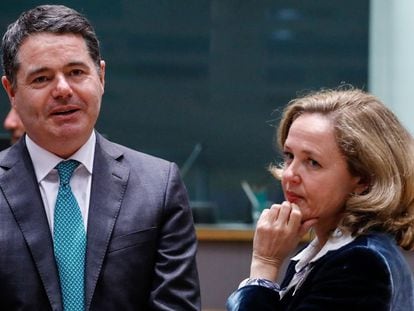The winners and losers from Sunday’s elections in Galicia and the Basque Country
The polls may have been regional, but they will have wide-reaching consequences on the national arena for groups such as the PSOE, the Popular Party and Unidas Podemos
/cloudfront-eu-central-1.images.arcpublishing.com/prisa/625WFTAJOBATJKYJDZRX2C33CY.jpg)
Sunday’s elections in Spain were in the Basque Country and Galicia regions, but they will have clear consequences for the national political scene. The winners of the polls yesterday are Galician premier Alberto Núñez Feijóo of the conservative Popular Party (PP) and Basque premier Iñigo Urkullu of the Basque Nationalist Party (PNV), but the problems are in Madrid.
The terrible result for left-wing Unidas Podemos serves once again to demonstrate – as the regional elections of 2019 did – that the party is still grappling with a deep internal crisis. Unidas Podemos leader and Deputy Prime Minister Pablo Iglesias has managed to conceal this thanks to the group’s good results at the general election and the party’s entrance into government in coalition with the Socialist Party (PSOE), but taking power has not served to resolve the crisis.
Unidas Podemos is a helpless organization, with problems in nearly all of its territories, which are manifesting themselves in endless internal battles. The result in Galicia on Sunday is the epitome of this suicidal phenomenon. “This was an unmitigated defeat,” said Iglesias of the vote. “We need an exercise of profound self-criticism.”
The regional elections in 2019 showed Unidas Podemos to be so weak that Prime Minister Pedro Sánchez believed that he could force Iglesias to accept a government where the PSOE governed alone. The elections this weekend in Galicia and the Basque Country, where Unidas Podemos has lost a total of 19 of its 25 seats, will without a doubt weaken its position in the coalition, and in particular when it comes to debates within the government about the upcoming plans for economic reconstruction in the wake of the coronavirus crisis.
But it is not just Unidas Podemos that has suffered from Sunday’s results. The entire coalition government has been weakened. The PSOE was not able to take advantage of the loss in popularity of Iglesias’s party. The winners were the Galician nationalist party BNG, and the pro-Basque independence leftists of EH Bildu. The confirmation that the PSOE does not benefit when Unidas Podemos loses votes is a major problem for Sánchez, who is seeking to recover the space that Iglesias took from the Socialists. The PSOE, which won the last two general elections, albeit falling short of a majority, is only the third party in both Galicia and the Basque Country, seeing Bildu double its seats in the latter region.
The result in the Basque Country has not raised concerns in La Moncloa prime ministerial palace, because the PNV is a trustworthy partner and will still need the PSOE in order to govern. But there is a worrying fact for the central parties: PNV and Bildu together picked up 67% of the votes on Sunday. A similar result for pro-independence parties in Catalonia would be explosive, with only the moderation of the PNV and its distance from Bildu avoiding the same effect in the Basque Country. From La Moncloa, sources insist that there is a clear dual vote. But the warning could not be clearer.
The other big loser is also in Madrid: the hardline faction of the Popular Party, which has taken control of the group through the PP’s current leader, Pablo Casado. The victory of Feijóo thanks to his moderate approach, and the total failure of the candidate presented by Casado in the Basque Country – who was not even able to prevent Vox from entering the regional government – will increase the pressure further on the Galician premier to make the jump to the national party. It would be a complex operation and is still a distant one, but these campaigns could force Casado to listen to the party’s regional chiefs who, with Feijóo at the forefront, are calling on the PP leader to return to the middle ground.
English version by Simon Hunter.

/cloudfront-eu-central-1.images.arcpublishing.com/prisa/FEDHTNZDUSDCVBRGA4JLJM4SWE.jpg)











































